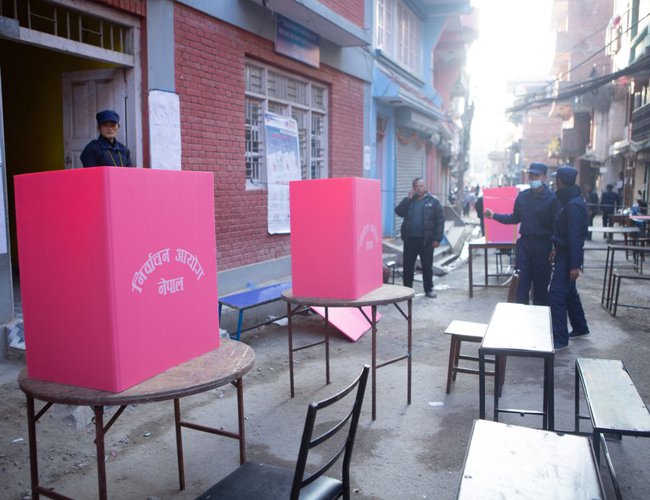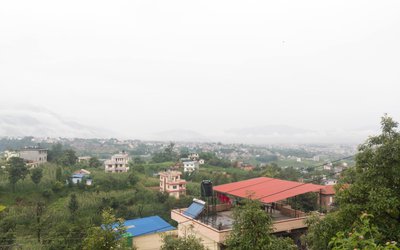
A total of 17,988,570 people – 9,140,806 males and 8,847,579 females – are exercising the voting right today casting their votes for the candidates of House of Representatives and Provincial Assembly across the country.
Nepalese are casting their votes for general elections 11th time since the first general elections was held in 1959. Voting practice began in Nepal in 1948 with the elections of municipality.
The first General elections were held in Nepal from 18 February to 3 April 1959 to elect the 109 members of the first House of Representatives. After dissolution of the first elected parliament, the first elections were held in 1971for Rastriya Panchayat. Second General Elections was held for Rastriya Panchayat in 1981 and second was held in 1986.
After the restoration of multi-party democracy in 1990, the first general elections were held in 1991, followed by second elections in 1995. The third elections were held in 1999. In the meantime, Nepal held National Referendums in 1979.
Following the peace agreement with Maoist, the first elections for Constituent Assembly was held in 2008 and second in 2013. After the promulgation of new constitution this is the second general elections.
General Elections 2022
According to the Election Commission (EC), all kinds of necessary steps have already taken to ensure the elections free, fair, fearless and credible manner.
Of the total 275 members of House of Representatives (HoR), 165 will be elected through direct voting while the remaining 110 will be elected through the proportional representation (PR).
Of the 550 members of seven provincial assemblies of the nation, 330 will be elected directly and 220 through PR system.
According to the Commission, 4,611 people are seeking a seat in the HoR. Of them, 2,412 are in the fray in the First-Past-The-Post (FPTP) contest while 2,199 are in the PR lot.
At the provincial level, 6,932 are standing to be elected to the provincial legislatures. Of them, 3,224 are hoping to be elected through the FPTP system while 3,708 are hoping for PR seats.
At the federal level, 867 are standing as independent candidates. That number is 1,094 for the provinces.
According to the commission, the total FPTP candidates for the HoR, 42.16 per cent come from the Khas Arya community, 20.98 per cent Madhesis, 26.58 per cent belong to indigenous nationalities, 4.02 per cent Dalits, 3.40 per cent Muslims and 2.8 per cent Tharus.
Altogether, 87 political parties are registered with the EC and are eligible to participate in the FPTP vote. However, the number of parties actually participating in the process is 61. According to the data provided by the EC, 47 parties have submitted closed lists of candidates for the PR system.
Among the parties, the main opposition CPN-UML has forged an alliance with Upendra Yadav’s Janata Samajwadi Party and Kamal Thapa's Rastriya Prajatantra Party-Nepal. The ruling coalition comprising Nepali Congress, CPN (Maoist Centre), CPN (Unified Socialist), Loktantrik Samajwadi Party and Rastriya Janamorcha, are also going into the election together.
To enable people to vote, the EC has fixed 10,892 polling stations and 22,227 polling centres across the country.
Additionally, it has also fixed 141 temporary polling stations from where around 450,000 voters will cast their ballots for the PR seats.
After the promulgation of the constitution in 2015, this is the second election for the HoR and provincial assemblies. The first one was held in two phases in 2017.
The government has also set up a three-tier security arrangement, with the police, Armed Police Force (APF) and the army forming concentric security circles around polling centres to ensure peace and safety at the booths. A total of 115,000 temporary police, 74,849 soldiers, 71,693 police personnel, 35,116 APF personnel and 1,821 officers of the National Intelligence Bureau have been deployed for security. What’s more, the country’s open border with India has also been sealed.
The government has also deployed bomb disposal teams at 903 places. Furthermore, reserve forces of security officials have also been managed in such a way that they will be able to reach any polling station in the country within 30 minutes, if required.
Likewise, EC has mobilized 246,960 employees and around 300,000 security personnel for the election.
Meanwhile, election commissioners from India, Bhutan, Bangladesh and Maldives along with 44 national and two international organizations will be observing the polls. Total 18 diplomatic missions based in Kathmandu will also observe the elections.
- EU Ambassador To Nepal Veronique Lorenzo Paid A Courtesy Call On Rana
- Jul 27, 2024
- 139 People Died In The Disaster
- Jul 27, 2024
- Monetary Policy Eases Managing Capital Fund Stress
- Jul 27, 2024
- Weather Forecast: Chances Of Heavy Rainfall Is Likely In One Or Two Places Of Sudu Paschim And Bagmati Province
- Jul 27, 2024
- The Sentiment Of Monetary Policy Seems Focused On Increasing Eemand: FNCCI President Chandra Prasad Dhakal
- Jul 26, 2024
















